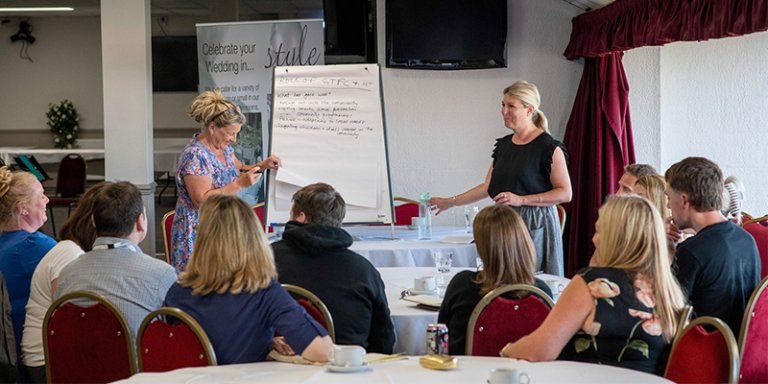A new playbook for effective leadership with Jon Stokes, Nigel Ball and Ian Taylor
20 November 2023
We spoke with Ordinary Hope core group members Jon Stokes and Nigel Ball about a new approach to leadership. And why it matters for politics. They were joined by Ian Taylor, co-author with Nigel of a new publication 'Cross-sector collaboration: Insights from a leaders' Playbook'.

The following article for Ordinary Hope is taken from an extended conversation Yasmin Ibison had with Jon Stokes, Nigel Ball and Ian Taylor. You can read the full transcript of their conversation here.
Cross-sector collaboration: Insights from a leaders Playbook by Nigel Ball and Ian Taylor
In his last leader's speech at the Labour Conference in 2006, Tony Blair warned his party about what voters expected from their leaders.
“The British people will, sometimes, forgive a wrong decision. They won't forgive not deciding. They know the choices are hard.”
Yet if leadership is defined by individuals making decisions, it is also defined by the limitations of their capacity to do so..
In recent years, the image of the lone leader has been tested by a world where complexity and chaos are the constants. If leadership requires decision-making, what if choices are no longer binary and events are moving fast? It’s a point made by Jon Stokes when he sat down to speak with other leading members of the Ordinary Hope team to discuss collaboration and leadership.
“In the past we had relatively more placid environments and we've now got turbulent ones, which means the whole conception of leadership must change to account for that. Traditional concepts of leadership, which are hierarchical and power-based, no longer suit the current environments that we work in. You can't simply control or direct people; you must shape the context in which people operate.”
A key lesson from the Ordinary Hope project has been recognising collaboration across expertise and experience as key to delivering lasting social change. This kind of collaboration could easily be characterised in opposition to what Tony Blair saw as the need for decisive leadership. Yet, Jon and other experts see it as an adaptation to the skills of traditional leadership. Whereas once lone decision-makers could operate effectively on their own, today’s leaders must mobilise a network of individuals and ideas.
For leaders, this approach can, at first, feel risky. Ultimately, leaders are accountable for outcomes, and so any dilution of decision-making or problem-solving risks decisions being made without oversight.
But as Jon and others have pointed out, the complexity of today’s world forces us to create a leadership model that mobilises collaboration; it is no longer a nice-to-have but a key component for success.
Nigel Ball and Ian Taylor have explored this in their new publication, Cross-sector collaboration: Insights from a leaders' Playbook. It is designed to be a manual for navigating this new world and enabling leaders to successfully deliver on lasting change.
As Ian makes clear:
“Leaders are in an information rich environment; they can access so much information, but they don’t always have the capacity to deeply understand it. Sometimes accessing the knowledge from certain information requires you to engage different perspectives and work with different actors. That is contrasted with the previous era of information scarcity, where leaders were forced into environments of command and control, because they didn't have as much information on what was going on.”
This underlines another shift in the demands placed on leaders. In an information rich world, communities, voters and employees are themselves rich in information and fairly or unfairly expect institutions and governments to grapple with the complexity of this.
In this context, the need for collaboration, as set out by Nigel and Ian, is key. And as Nigel puts it, this complexity of data points is matched by the scale of the challenges facing us.
“The field of challenges to tackle societally is so broad and so complicated that it's foolish to think that any single institution can do it alone. In some ways it’s the government’s job to tackle these sorts of problems, but they don't have all the answers. They can't do it alone. And civil society equally has a really important role to play. But they can't do it single handedly either.”
In their playbook, Nigel and Ian explore the big challenges which require cross cutting collaboration.
“The way that governments usually face industry, or the commercial market, is to regulate it or transact with it. The idea of collaborating with it is unusual, and people don't know quite how to do it.” Nigel says.
This is why Ordinary Hope is working to explore and understand the formula for successful collaboration, and live the ethos of collaboration. In truth, successful leaders have always had to collaborate. Even in their isolated decision-making, they will have sought to reconcile the differences within their teams and wider society.
As Jon sets out in his joint paper From Ego to Eco: Leadership for the Fourth Industrial Revolution with Sue Dopson, Rhodes Trust Professor of Organisational Behaviour '...a move away from ‘heroic’ individualistic leadership (‘ego’) towards a leadership that recognises the organisation as a system nested in other systems (‘eco’) is needed'.
As the world faces new challenges, with diverse and divergent perspectives, this ability to convene and collaborate is more important than ever.
If today's leaders are to overcome these challenges, they’ll need new tools for success.
You can read the full transcript of Jon, Nigel, Ian and Yasmin’s conversation here.
To find out more about the Ordinary Hope project, sign up for the UCL Policy Lab newsletter here.
 Close
Close

